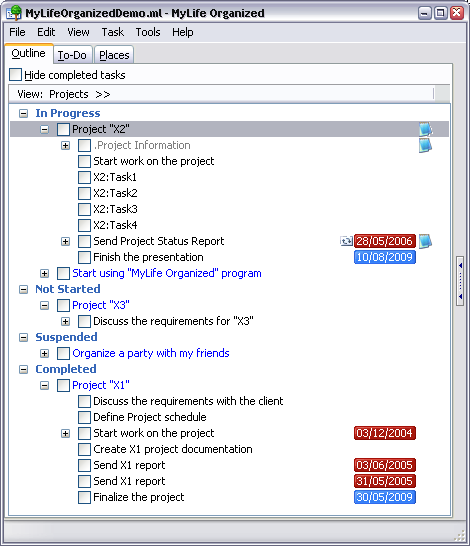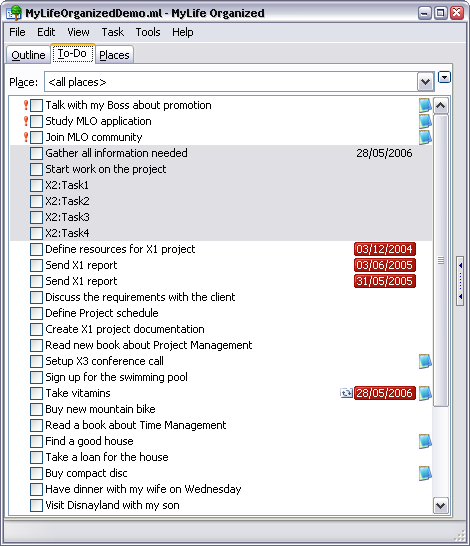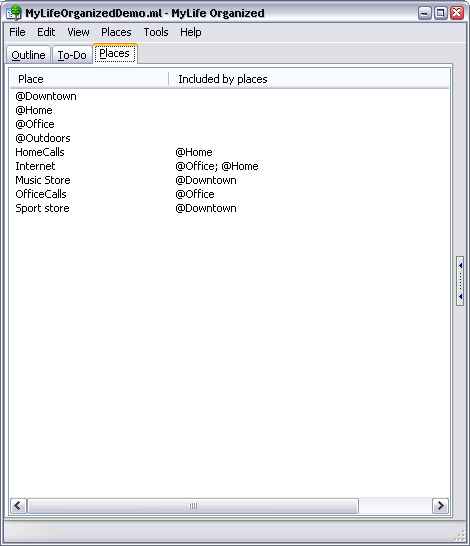Although I’m pretty happy with the success of using first 5-section A4 organizer and then the MyLifeOrganized software for keeping track of my daily tasks and plans, I’m still looking for an even better way to manage tasks. So I thought I’d post a list of things I’d like to concentrate on, and I will either update this entry later or keep coming back to it, or perhaps (even better!) I’ll get some feedback and pointers to things which do just what I need. Here it is, the list of things I need to find a better way of managing:
- Accessibility of my notes, tasks, plans and other information I need to find a way of having the information accessible most of the time. One of the nice solutions is the organizer I’ve mentioned already. I can always take it with me, but unfortunately it’s impossible to keep track of everything in an A4 sized 5-section organizer – it has physical limitations, and there is only so much I can always carry with myself. This suggests that I probably need to use computer for organizing and managing my life. And since it has to be portable, it should probably be something online. So please keep this in mind as you read on, I’m looking for an online service (preferred) or a software which could be easily synchronized with an online service. I don’t want to make the task even more technical, but I don’t exclude the possibility of eventually having to write the software myself. Luckily I’m quite capable, so if I don’t find anything really good – I’ll just concentrate on coding. Another thing about accessibility is that I would like to be able to search through my tasks and notes. Search using keywords or filters, like being able to see the list of tasks for today, for the current week, etc. Another vital part of accessibility for me is having a history of all the tasks completed.
- Ideas. I get at least 5 or 6 really interesting ideas a day. And while some of them could be immediately converted into some actions waiting to happen, others are just that – they’re still ideas. So I don’t need to act on them in the foreseeable future, but I would really like to store them somewhere. As of right now, I find Google’s Notebook to be one of the best services. It fits perfectly into my lifestyle, and all the notes are finally in one place and searchable. Too bad there is no way to have a tree-like structure, although it’s possible to have multiple notebooks within a single Google account. It’s so easy to use this notebook with my Firefox browser, that I think I can live with some things which are still far from being ideal in this notebook.
- Contacts It’s a rather big category. I’m looking for a way of not only keeping all the contacts info organized, but also being able to track my communication in a more effective way. For instance, here should go reminders about phone calls to be made, be it a business or a personal matter. I’m not looking for a daily planner here. I need something more intelligent than that. I would like to have a tool which would remind me to call these friends of mine I haven’t spoken to in a while, and to be able to set some reasonable time limits for such reminders. So that I would be reminded to give a call once, and if I didn’t make it, I’d like to get another reminder a bit later. Do such things exist?
- Complex projects I think that all I really need is a flexible way of managing multiple projects and tracking few goals simultaneously. There are tons of project management tools, so I guess the only challenge here is to find one integrated tightly enough with the rest of my wishes outlined above. I’m planning to go and give a try to most of the Web 2.0 to-do lists and project management services, just to get a better idea of the current state of things in this field.
- Balancing activities It is very important to maintain a healthy balance of all the activities you’re involved with. The bigger look at balancing means finding the right proportion between your personal life and work, and a more thorough approach requires ensuring that within these big categories of your activities you give equal (or at least, predefined) amounts of time and attention to every aspect of your activities. This is something I’m only beginning to apply in my everyday life, and that is one of the reasons why I feel like concentrating on this. I strongly believe that wrongly chosen balancing in itself is capable of ruining the positive effects of almost all the rest efforts of yours in staying organized and progressing with your self-growth.
I think it’s enough for the first post on this subject. I didn’t want to put any more URLs to external resources, simply because I’m not prepared to do so yet. I’d like to go and explore all the available services myself, and so it may be some time before I get back to this to post some updates. Still, the reason I’m posting it is that I hope some of you could give me valuable pointers to things you like using on a daily basis, so I’m asking for your help here. If you found some online service particularly useful, please let me know. If you want, then give me some explanations, and if you don’t, just post a URL and a single-line description of what the service does. Thanks in advance!


